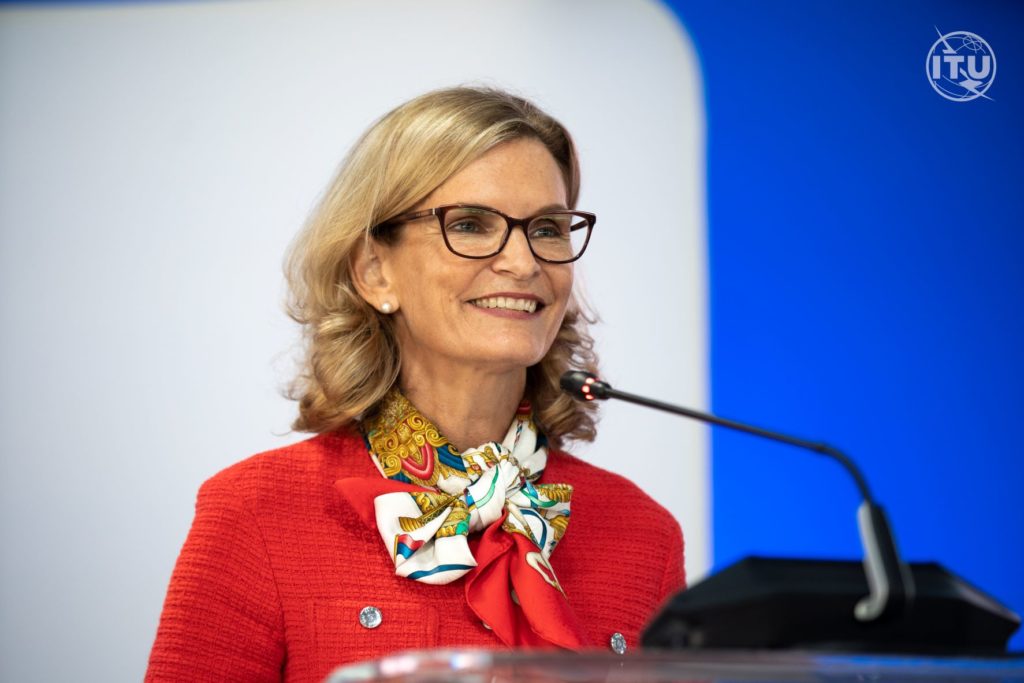In historic elections, Bogdan-Martin received the majority of Member State votes, pledging meaningful connectivity as her goal. She will be the first woman to lead the UN specialized agency in its 157-year history
Member States of the International Telecommunication Union (ITU) have elected Doreen Bogdan-Martin of the United States of America as the organization’s next Secretary-General.

Bogdan-Martin will be the first woman to lead ITU, which was established in 1865 and became a United Nations specialized agency in 1947.
The election took place during ITU’s Plenipotentiary Conference (PP-22) in Bucharest, Romania, with representatives of Member States voting during the meeting’s morning session. Bogdan-Martin won the position with 139 votes, out of 172 votes cast.
“Whether it’s today’s children or our children’s children, we need to provide them with a strong and stable foundation for growth,” Bogdan-Martin said.
“The world is facing significant challenges – escalating conflicts, a climate crisis, food security, gender inequalities, and 2.7 billion people with no access to the Internet.
I believe we, the ITU and our members, have an opportunity to make a transformational contribution. Continuous innovation can and will be a key enabler to facilitate resolution of many of these issues.”
Ms Bogdan-Martin has held leadership positions in international telecommunications policy for over two decades.

Throughout her career, she has brokered innovative and visionary partnerships with the private sector, civil society, and other United Nations agencies to accelerate digital inclusion and connectivity.
Bogdan-Martin will begin her four-year term as ITU Secretary-General on 1 January 2023.
The Secretary-General-elect has pledged “to continue driving this institution to be innovative and increasingly relevant for our Member States, better positioning all of us to embrace the digital environment and make progress on achieving UN Sustainable Development Goals and connecting the unconnected.”
Inclusive digital development
Bogdan-Martin was endorsed by her country’s government as a candidate to make the digital future inclusive and accessible for everyone, especially in developing countries.
US President Joe Biden, in a 20 September statement backing her candidacy, said: “Ms. Bogdan-Martin possesses the integrity, experience, and vision necessary to transform the digital landscape.”
As chief architect of ITU’s development work in recent years, Bogdan-Martin has emphasized the need for digital transformation to achieve economic prosperity, job creation, skills development, gender equality, and socio-economic inclusion, as well as to build circular economies, reduce climate impact, and save lives.
Her current term as Director of ITU’s Telecommunication Development Bureau ends on 31 December 2022.
Among her campaign priorities, she said she would “lead ITU into a new era of global and regional partnerships,” adding that the organization “must evolve and sometimes break from old ways” to stay relevant.

Electing ITU’s other top leaders
At the ITU Plenipotentiary Conference, Member States will also elect candidates to the posts of Deputy Secretary-General, Radiocommunication Bureau Director, Telecommunication Standardization Bureau Director, and Telecommunication Development Bureau Director.
The voting for ITU’s senior leadership will be followed by elections for the 12-member Radio Regulations Board and for regionally allocated Member State places on the 48-seat ITU Council, which governs ITU between quadrennial Plenipotentiary Conferences.
About ITU
The International Telecommunication Union (ITU) is the United Nations specialized agency for information and communication technologies (ICTs), driving innovation in ICTs together with 193 Member States and a membership of over 900 companies, universities, and international and regional organizations.
Established over 150 years ago, ITU is the intergovernmental body responsible for coordinating the shared global use of the radio spectrum, promoting international cooperation in assigning satellite orbits, improving communication infrastructure in the developing world, and establishing the worldwide standards that foster seamless interconnection of a vast range of communications systems.
From broadband networks to cutting-edge wireless technologies, aeronautical and maritime navigation, radio astronomy, oceanographic and satellite-based earth monitoring as well as converging fixed-mobile phone, Internet and broadcasting technologies, ITU is committed to connecting the world. For more information,














